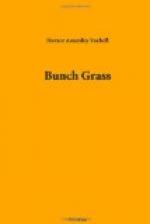I shall not attempt to describe the horrors that filled the next three weeks. But, not for the first time, I was struck by the heroism and self-sacrifice of these rude foothill folk, whose great qualities shine brightest in the dark hours of adversity. My brother and I had passed through the big boom, when our part of California had become of a sudden a Tom Tiddler’s ground, where the youngest and simplest could pick up gold and silver. We had seen our county drunk with prosperity —drunk and disorderly. And we had seen also these same revellers chastened by low prices, dry seasons, and commercial stagnation. But we had yet to witness the crowning sobering effect of a raging pestilence.
The little schoolmarm, Alethea-Belle Buchanan, organised the women into a staff of nurses. Mrs. Dumble enrolled herself amongst the band. Did she take comfort in the thought that she was wiping out John Jacob Dumble’s innumerable rogueries? Let us hope so.
Within a week yellow bunting waved from half a score of cottages in and about Paradise. And then, one heavenly morning, as we were riding into the village, we saw the hideous warning fluttering outside George Leadham’s door.
Sissy was down with it!
Poor George, his brown, weather-beaten face seamed with misery, met us at the garden gate.
“She’s awful bad,” he muttered, “an’ the doc. says she’ll be worse afore she’s better.”
Next door a man was digging two graves in his garden.
Meantime, Pap Spooner had disappeared. We heard that he had gone to a mountain ranch of his about fifteen miles away. Nobody missed him; nobody cared whether he went or stayed. In the village store it was conceded that Pap’s room, rain or shine, was better than his company. His name was never mentioned till it began to fall from Sissy Leadham’s delirious lips.
The schoolmarm first told me that the child was asking for Andrew Spooner, moaning, wailing, shrieking for “pore old Pap.” George Leadham was distracted.
“What in thunder she wants that ole cuss fer I can’t find out. She’s drivin’ me plum crazy.” I explained.
“That’s it,” said George. “It’s bin Pap an’ her money night an’ day fer forty-eight hours. She wanted ter give him—him, by Jing!—her money.”
The doctor heard the story half an hour later. He had not the honour of Andrew Spooner’s acquaintance, and he had reason to believe that all men in the foothills were devoid of fear.
“Fetch Pap,” said he, in the same tone as he might have said, “Fetch milk and water!” We made no remark.
“I think,” said the doctor, gravely, “that if this man comes at once the child may pull through.”
“By Heaven! he shall come,” said George Leadham to me. The doctor had hurried away.
“He won’t come,” said Ajax.
“If he don’t,” said the father, fiercely, “the turkey-buzzards’ll hev a meal, for I’ll shoot him in his tracks.”




